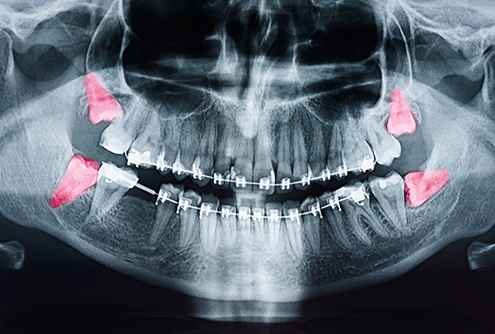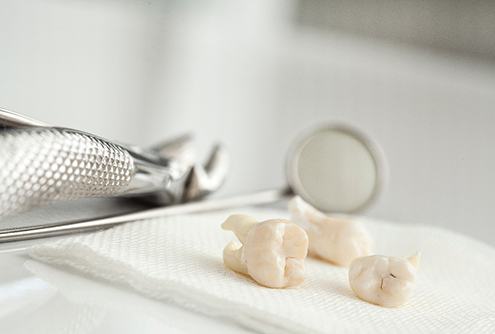


Are you or your child struggling with constant jaw pain? It could be due to the third set of molars: wisdom teeth. Fortunately, our talented McMinnville dentist, Dr. Ramsay, can make complications like these “disappear” with his gentle approach. Plus, we offer this procedure in-house, saving you from having to visit an outside specialist for wisdom tooth extractions in McMinnville, OR. To learn more and schedule an appointment, contact us today.

The wisdom teeth, or third molars as they are also known, were extremely useful for our caveman ancestors whose diet mostly consisted of tough roots and uncooked meats. Today, however, most modern people simply don’t have enough room for them in their mouth. When they start to come in, they can become stuck, put pressure on the nearby teeth, create pain, and even develop an infection if ignored.

During routine checkups, we always keep an eye on the development of wisdom teeth so we can recommend they be removed before they actually cause any problems. However, if you or your child develop any of the following symptoms, be sure to reach out to our emergency dentist right away:

At your initial appointment, we will take X-rays, take a look at your teeth, and create a custom treatment plan. If your wisdom teeth have already broken through the gumline, then we may be able to simply rock them loose with a special tool. If they are below the gumline, then we will need to take a surgical approach, which requires an incision to be made. In both cases, however, the first step is thoroughly numbing your mouth. As a result, you won’t feel anything!

Before you leave our office, we will place gauze over the extraction site and provide you with detailed post-op instructions. Here are a few:
If you want to schedule an appointment or you simply have questions about the process of removing a wisdom tooth, don’t hesitate to get in touch with us.
Before you have your wisdom teeth extracted, it’s a great idea to ask your dentist any questions you might have regardless of how minor they may seem. Your dentist will give you detailed guidelines on how to prepare for your surgery, and while the details may vary based on your situation, they will probably include tips like:
Wisdom tooth extractions are performed with the patient under dental sedation or anesthesia, rendering the process completely painless. You may feel some slight pressure as your teeth are gently worked out of their sockets, but this should not cause you any discomfort. While you can expect some soreness and discomfort after the procedure, you should feel back to normal after about a week if you follow your dentist’s aftercare instructions.
If you are pursuing orthodontic treatment, your dentist or orthodontist may recommend having your wisdom teeth extracted beforehand. In many cases, the wisdom teeth coming into a mouth that doesn’t have enough room for them can crowd the other teeth, pushing them out of alignment and ruining the progress or results of your orthodontic treatment. This can happen even if you wear your retainer every night. In many cases, wisdom teeth begin to emerge after a patient has undergone orthodontic treatment, and having them extracted is necessary to prevent the results from being undone.
Leaving troublesome wisdom teeth in while wearing braces can restrict how much the teeth can move while the braces continue to pull on them, causing teeth to break or crack. This can require a patient to have root canals, dental crowns, or even extractions of non-wisdom teeth. Removing your wisdom teeth before getting braces can make your orthodontic treatment simpler, more effective, and more permanent.
To drink through a straw, the mouth must create a suction force that can displace the blood clot that forms to protect the surgical site after wisdom teeth extraction. If this blood clot is dislodged, it can leave the vulnerable tissues underneath it exposed, causing a severely painful condition called dry socket. How long you should wait before drinking through a straw again depends on your age, your medical history, how fast you heal, and other factors, but it’s generally accepted that you should wait at least two or three days. Your dentist will give you a precise and personalized recommendation based on your needs and circumstances.